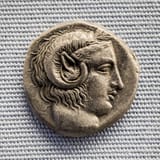>>40951245
>>40952153
Modern etymologies for this theonym (or epithet of a deity) have not been proposed, however, formal etymological analysis easily allows for two reconstructions: *kr8-n- or *kr8-sn-4 with the correct reflection of the syllabic -r8- for most Greek dialects of the 1st millennium BC. This analysis allows us to ask the question of how this base should be reflected in dialects like Mycenaean or the Aeolic group, where the syllabic -r8- gives a reflex in the form of -or-/-ro-. It is not difficult to see that in this case we unexpectedly also obtain the name of the deity -
Krovno". The latter circumstance could testify
to the antiquity of the epithet, preceding in time even the division of Greek dialects according to the way in which they reflect reflexes of syllabic sonants.
Although the name of Kronos is not attested in Mycenaean texts, the Homeric poems, in which the clearly
Mycenaean patronymic suffix -ivwn (Kronivwn) is preserved along with the patronymic suffix -ivdh" (Zeus Kronid - Kronivdh"), clearly testify with all
certainty that the name Kronos may go back to the 2nd millennium BC. It is important to note that Kronos himself
belongs to the generation that is designated as the generation
‘past gods’ (Hesiod. Theog. 486). The division into
“past” and “present” gods, as it was shown, in particular, in the works of Vyach. Vs. Ivanov, is present in a number of
traditions of the 2nd millennium BC, in particular, in the Hittite.
Further comparison of the theonym with the data of other Indo-European traditions can probably also be continued
and, in particular, a phonetic comparison with
the ancient Indian theonym Kṣṇa – Krishna, which denotes one of the incarnations of Vishnu (Erman, Temkin 1975: 202; Bryant
2007) suggests itself. In the Sanskrit tradition, the epithet remained extremely clear from the point of view of the internal form (‘black’) and does not cause
particular difficulties from the standpoint of modern etymological analysis
